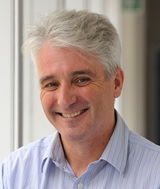Ian Main FRSE, FRSA, MAE, Professor of Seismology and Rock Physics

Research Ian is interested in the processes that lead up to catastrophic failure events, from earthquakes, rock fracture, and volcanic eruptions to failure of building materials and bridges, and in quantifying the resulting hazard. Particularly interests include the population dynamics of localised brittle failure as a complex, non-linear (unreasonable) system, as well as fundamental deformation processes, fluid-rock interactions and fluid flow involving fractures in the subsurface. This now includes squashing rocks in a synchrotron, so we can image the processes leading up to catastrophic failure using x-ray ‘vision’, while simultaneously listening to the ‘sound’ generated by local brittle fracture in the rock.
Specific interests in Seismology include earthquake hazard, earthquake predictability, non-linear dynamics and statistical mechanics of earthquake sources, operational earthquake forecasting and earthquake triggering. Specific interests in Rock Physics include fluid flow in fractured media, fracture scaling, fluid-rock interactions during deformation, coupling of mechanical, chemical and hydraulic processes, and time-dependent deformation.
Current funded research projects as Principal include (a) ‘On the Edge’ (of catastropic failure) and (b) ‘Source parameters of Historical UK Earthquakes’. Recent funded projects as PI or co-I inlcude (c) ‘Tomorrow’s Cities‘, the UKRI GCRF Multi-Hazard Urban Disaster Risk Transitions Hub, (d) ‘Earthquake RIsk reduction for a reSilient Europe (RISE)’, (e) ‘The central Apennines Earthquake cascade – under a new microscope’, (f) ‘Catastrophic Failure: what controls precursory damage localisation in rocks?’ (CATFAIL) , (g) ‘Rift volcanism: past, present, future’ RIFTVOLC, and (h) ‘Prospective aftershock forecasting of the Norcia 2016 earthquake sequence, Central Appenines, Italy’.
Teaching Current teaching responsibilities include pre-honours courses in ‘Introduction to Geophysics’ and ‘Physics of the Earth’ and an honours course in ‘Natural Hazard and Risk’, the latter two as course organiser.
Service Ian is currently a member of the Natural Environmental Research Council Science Committee and the Royal Society of Edinburgh Research Committee. He recently stepped down as Director of Research and ex officio member of the School of GeoSciences Policy and Resources Committee and ex officio the College of Science and Engineering Research Committee at the University of Edinburgh. He served as a member of the HEFCE Research Excellence Framework (REF 2014) Panel on Earth Systems and Environmental Sciences, and recently completed terms as a member of the Scottish Regional Advisory Group for Enhanced Learning and Research for Humanitarian Assistance (ELRHA) and the Research Advisory Forum of the Scottish Energy Technology Partnership (ETP).
Ian moderated the Nature website debate on earthquake prediction in 1999, and served as a member of the International commission on earthquake forecasting for civil protection, chaired by Tom Jordan, following the destructive earthquake in L’Aquila, Italy in 2009. It’s peer-reviewed full report, including findings and recommendations, was published in 2011. This body of work work has generated significant Impact on society.
Awards Ian gave the Bullerwell lecture in Geophysics in 1997, and was elected a fellow of the Royal Society of Edinburgh (RSE, Scotland’s National Academy) in 2009. He completed a Scottish Government/RSE research support fellowship in 2011. He has been a visiting researcher at École Normal Supérieure, Paris (1999), University of Bologna (2020), and visiting professor at the Centre for Mathematical Research, Barcelona (2021) and Stanford University (2022). He was awarded the Louis Néel Medal of the European Union of Geosciences in April 2014, and gave the Ed Lorenz lecture in Non-linear Geophysics at the centennial meeting of the American Geophysical Union in 2019, available for viewing here. He was elected Member of Academia Europeae, Europe’s Academy in 2022, and fellow of the Royal Society of Arts in 2023.
Contact
Phone: +44 131 650 4911
Fax: +44 131 668 3184
Email: ian.main[at]ed.ac.uk

